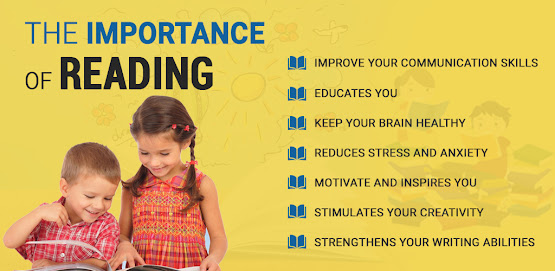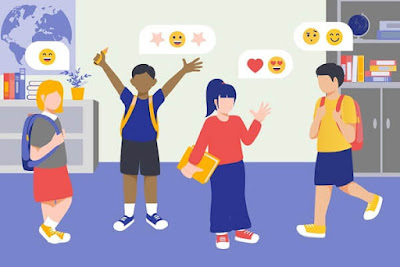Reading is a fundamental skill that has been taught and valued for centuries. Not only is it an essential tool for academic success, but reading can also have a significant impact on personal growth and development. Reading allows us to expand our knowledge, broaden our perspective, and develop crucial cognitive and analytical skills. In this article, we'll explore the many benefits of reading, including how it can improve cognitive function, promote mental health, enhance personal growth and development, and improve academic and professional success. We'll also provide tips on how to cultivate a reading habit and read more effectively. Whether you're an avid reader or looking to start a new habit, this article will show you just how important and rewarding reading can be.
Benefits of Reading
A. Improves Cognitive Function
Reading is one of the most effective ways to enhance cognitive function. Cognitive function refers to the mental processes and abilities that are necessary for everyday life. Reading provides the brain with the necessary stimulation to improve cognitive function in various ways.
- Enhances Brain Connectivity: Reading requires our brains to make connections between different pieces of information, which helps to create new neural pathways and enhance overall brain connectivity. This increased connectivity can lead to improved memory, attention, and problem-solving abilities. For example, if you read a book about a complex topic such as astrophysics, your brain must work to connect the various pieces of information presented in the book in order to fully comprehend the concepts being discussed.
- Increases Vocabulary and Knowledge: Reading is an excellent way to expand your vocabulary and knowledge. When we read, we encounter new words and concepts that we may not come across in our daily lives. This exposure to new language helps to build a broader understanding of the world around us. For example, if you read a book about a historical event, you may encounter new words related to that time period that are not commonly used today.
- Boosts Analytical Skills: Reading can also help to boost analytical skills. When we read, we are constantly analyzing and interpreting the information presented on the page. This requires us to think critically and draw logical conclusions based on the evidence presented. By doing this, we can improve our ability to think logically and make informed decisions. For example, if you read a mystery novel, you must analyze the clues presented throughout the story in order to solve the mystery.
- Develops Empathy and Emotional Intelligence: Reading can also help to develop empathy and emotional intelligence. When we read stories, we are exposed to different perspectives and experiences, which can help us to better understand and empathize with others. This increased understanding can improve our interpersonal relationships and communication skills. For example, if you read a novel about a character from a different cultural background, you may gain a better understanding of their experiences and be better equipped to relate to people from different backgrounds in your own life.
Reading is an incredibly powerful tool for improving cognitive function. It can enhance brain connectivity, expand our vocabulary and knowledge, boost analytical skills, and develop empathy and emotional intelligence. By incorporating reading into our daily routines, we can reap the many benefits that come with a stronger cognitive function.
B. Promotes Mental Health
- Reduces Stress and Anxiety: Reading can be a great way to unwind and reduce stress and anxiety. Research has shown that reading can be an effective way to lower cortisol levels, which are the hormones associated with stress. In addition, reading can provide a distraction from the stresses of daily life and allow us to focus on something positive and enjoyable. For example, reading a calming novel before bed can be a great way to wind down and prepare for sleep.
- Improves Sleep Quality: In addition to reducing stress and anxiety, reading before bed can also improve sleep quality. The blue light emitted from electronic devices such as smartphones and tablets can disrupt our sleep patterns, but reading a physical book or e-reader with a non-backlit screen can provide a calming alternative. In fact, a study conducted by the University of Sussex found that reading for just six minutes before bed can reduce stress levels by up to 68% and improve sleep quality.
- Delays Cognitive Decline and Dementia: Reading has been shown to be an effective way to delay cognitive decline and reduce the risk of dementia. This is because reading can help to exercise the brain and keep it functioning at a high level. In addition, the social and cognitive engagement that can come with participating in book clubs or discussing books with others can provide additional cognitive benefits. For example, a study conducted by the Rush Alzheimer’s Disease Center found that reading, along with other cognitive activities, was associated with a reduced risk of developing Alzheimer's disease.
Reading can provide a range of mental health benefits, including reducing stress and anxiety, improving sleep quality, and delaying cognitive decline and the risk of dementia. By incorporating reading into our daily routines, we can improve our overall mental health and well-being.
💚 May be you like: Why Is Social-Emotional Learning Important And What Is Social-Emotional Learning
C. Enhances Personal Growth and Development
Reading can also be a powerful tool for personal growth and development, as it allows individuals to explore new perspectives and ideas. Here are some of the ways reading can enhance personal growth and development:
- Fosters Creativity and Imagination: Reading can inspire creativity and imagination by exposing us to new ideas, perspectives, and worlds. By immersing ourselves in stories, we can develop our own creativity and imagination, as well as gain new insights and perspectives. For example, reading a novel can transport us to a different time and place, and allow us to experience things we might not have otherwise. This can help us develop our own creative thinking skills, as well as inspire us to create our own stories, art, or other forms of expression.
- Expands Worldview and Perspective: Reading can also expand our worldview and perspective by exposing us to new cultures, experiences, and ways of thinking. By reading books from different genres, authors, and cultures, we can gain a broader understanding of the world around us and become more empathetic towards others. For example, reading books about different cultures can help us appreciate the diversity of the world and become more accepting of different ways of life.
- Builds Stronger Relationships: Reading can also help build stronger relationships with others. By sharing our reading experiences with others, we can develop common interests and topics of conversation, as well as deepen our understanding of each other. For example, joining a book club or discussing books with friends or family can help us develop closer relationships with those around us.
- Enhances Communication Skills: Reading can also enhance our communication skills by improving our vocabulary, grammar, and comprehension. By exposing ourselves to a wide range of writing styles and genres, we can develop our own writing skills and become better communicators. For example, reading books with complex vocabulary or challenging subject matter can help us develop our own language skills, as well as improve our ability to understand and interpret complex information.
Reading can enhance our personal growth and development by fostering creativity and imagination, expanding our worldview and perspective, building stronger relationships, and enhancing our communication skills. By making reading a regular part of our lives, we can develop these important skills and become more well-rounded individuals.
D. Improves Academic and Professional Success
- Enhances Academic Performance: Reading is a key component of academic success, as it helps students develop their comprehension, critical thinking, and analytical skills. By reading textbooks, articles, and other academic material, students can gain a deeper understanding of their subject matter and perform better on exams. In addition, reading can help students develop better writing skills and learn how to communicate their ideas effectively.
- Develops Critical Thinking Skills: Reading can also help develop critical thinking skills by exposing us to different perspectives and arguments. By reading books that challenge our assumptions and beliefs, we can learn to think critically about complex issues and form our own opinions. This can be especially important in today's world, where we are constantly bombarded with information and need to be able to evaluate it critically.
- Boosts Career Prospects and Employability: Reading can also boost our career prospects and employability by improving our knowledge, skills, and abilities. By reading books related to our field or industry, we can stay up-to-date on the latest trends and developments, as well as gain new insights and perspectives. In addition, reading can help us develop soft skills like communication, empathy, and emotional intelligence, which are highly valued by employers.
- For example, a business professional might read books on leadership, marketing, and finance to stay current in their field. A teacher might read books on pedagogy and educational theory to improve their teaching skills. A scientist might read academic journals and research papers to stay up-to-date on the latest discoveries in their field.
Reading can enhance our academic and professional success by improving our comprehension, critical thinking, and analytical skills, as well as our knowledge and employability. By making reading a regular part of our personal and professional lives, we can develop these important skills and achieve our goals.
The Importance of Reading for Children
Reading is especially important for children, as it lays the foundation for their future success. Early literacy skills development is crucial for children, as it sets the stage for their academic performance and lifelong love for reading. By exposing children to books and reading with them, parents and caregivers can help to develop their early literacy skills and foster a love for reading that will last a lifetime.
Benefits of Reading for Children
Reading has many benefits for children, both cognitive and emotional. Some of the benefits include:
- Reading improves vocabulary and language skills. Children who read regularly learn new words and expressions, and become more proficient in using language. Reading also helps children to understand grammar, syntax, and punctuation rules.
- Reading enhances comprehension and critical thinking skills. Children who read regularly learn to follow a story line, identify the main idea and supporting details, make inferences and predictions, and evaluate the author's purpose and perspective. Reading also helps children to develop their own opinions and perspectives on various topics.
- Reading stimulates imagination and creativity. Children who read regularly immerse themselves in different worlds, characters, and situations. Reading helps children to imagine new possibilities, explore different perspectives, and express their own ideas and feelings.
- Reading fosters empathy and social skills. Children who read regularly encounter diverse characters, cultures, and experiences. Reading helps children to understand and appreciate different points of view, emotions, and behaviors. Reading also helps children to develop their own sense of identity and belonging.
- Reading boosts confidence and motivation. Children who read regularly experience a sense of achievement and satisfaction. Reading helps children to develop their self-esteem, self-efficacy, and self-regulation skills. Reading also helps children to discover their interests and passions, and to pursue their goals.
How to Support Children's Reading Habits:
Parents and caregivers play a vital role in supporting their children's reading habits. Some of the ways they can do so include:
- Providing access to a variety of books and reading materials. Parents and caregivers can create a home library with books that suit their children's interests, preferences, and reading levels. They can also visit public libraries, bookstores, or online platforms to access more books and reading resources.
- Modeling positive reading behaviors. Parents and caregivers can show their children that they value reading by reading themselves, sharing their favorite books or authors, or discussing what they have read with their children. They can also encourage their children to read by praising their efforts, celebrating their achievements, or rewarding them with more books or reading time.
- Reading with or to their children. Parents and caregivers can read with or to their children every day, or as often as possible. They can make reading a fun and enjoyable activity by choosing books that interest their children, using different voices or expressions, asking questions or making comments, or relating the stories to their children's lives.
- Creating a supportive reading environment. Parents and caregivers can create a comfortable and inviting space for reading at home, such as a cozy corner with cushions, blankets, lamps, or posters. They can also minimize distractions such as noise or screens during reading time, and respect their children's choices and preferences when it comes to reading.
Reading is especially important for children, as it lays the foundation for their future success. Early literacy skills development is crucial for children, as it sets the stage for their academic performance and lifelong love for reading. By exposing children to books and reading with them, parents and caregivers can help to develop their early literacy skills and foster a love for reading that will last a lifetime. Parents and caregivers can support their children's reading habits by providing access to a variety of books and reading materials, modeling positive reading behaviors, reading with or to their children, and creating a supportive reading environment. Reading is not only beneficial for children's cognitive and emotional development but also a source of joy and pleasure. By encouraging their children to read regularly from an early age parents can help them discover the wonders of reading.
Tips for Cultivating a Reading Habit
Reading is a great way to relax, expand your knowledge, and improve your mental and emotional health. However, for many people, finding the time and motivation to read can be a challenge. Here are some tips for cultivating a reading habit:
- Set Reading Goals: Set realistic goals for how much you want to read each day or week. For example, you might start by setting a goal of reading for 10-15 minutes a day, and gradually increase your reading time as you become more comfortable.
- Schedule Reading Time: Set aside a specific time each day for reading, such as before bed, during your lunch break, or on your commute. By making reading a regular part of your daily routine, you'll be more likely to stick with it.
- Choose Books That Interest You: Select books that align with your interests and hobbies. Whether you enjoy fiction, non-fiction, biographies, or memoirs, there's a book out there for everyone.
- Join a Book Club: Joining a book club can help you stay motivated to read and provide a social outlet for discussing books with like-minded individuals.
- Make Reading Enjoyable: Create a cozy reading nook in your home, listen to soothing music or ambient sounds while you read, or treat yourself to a cup of tea or coffee. By making reading a relaxing and enjoyable experience, you'll be more likely to want to do it.
By implementing these tips, you can create a reading habit that fits your lifestyle and interests. Whether you prefer physical books, e-books, or audiobooks, reading can be a fun and enriching activity that benefits your overall well-being.
How to Read Effectively
Reading is not only about getting through the material, but also about understanding and retaining the information. Here are some tips for reading effectively:
- Active Reading Strategies: To read actively, try to engage with the text by highlighting important passages, underlining key points, and asking yourself questions about what you're reading. This will help you stay focused and retain the information.
- Note-Taking and Summarizing: Jotting down notes or summarizing what you've read in your own words can help you process the information and remember it more easily. This is especially helpful for academic or professional reading, where you need to recall the information later.
- Analyzing and Critiquing: When reading critically, try to evaluate the arguments or claims being made in the text. Ask yourself questions like "Does this make sense?" or "What evidence supports this claim?" This will help you develop a deeper understanding of the material.
- Skimming: Skimming involves quickly glancing over the text to get a general idea of the content. This can be helpful when you're trying to determine whether a text is worth reading in full, or when you're looking for specific information.
- Scanning: Scanning is similar to skimming, but involves looking for specific keywords or phrases in the text. This can be useful when you're looking for information on a particular topic or when you're trying to locate a specific piece of information.
- Previewing: Previewing involves looking at the headings, subheadings, and other organizational features of a text before reading it. This can help you get a sense of the overall structure and content of the text, which can make it easier to read and understand.
- Active Engagement: Actively engaging with the text can help you stay focused and retain information. Try to ask yourself questions about what you're reading, and make connections between the material and your own experiences or knowledge.
- Mind Mapping: Mind mapping is a visual technique that involves creating a diagram of the key ideas and concepts in a text. This can help you organize and remember the information, and can be especially useful for visual learners.
- Practice: Like any skill, effective reading takes practice. Try to make a habit of reading regularly, and experiment with different techniques to find what works best for you.
By incorporating these techniques into your reading practice, you can improve your ability to read effectively and retain information. Remember, effective reading is about more than just getting through the material – it's about engaging with the text and understanding it on a deeper level.
Conclusion
Reading is a powerful tool that can have a profound impact on our personal and academic growth, mental health, and professional success. By reading regularly, we can enhance our cognitive function, promote mental health, expand our worldviews, and develop critical thinking and communication skills.
To cultivate a reading habit, it's important to set goals, schedule reading time, choose books that interest you, and make reading enjoyable. Additionally, by employing active reading strategies such as note-taking, summarizing, and analyzing, we can read more effectively and retain information more easily.
Reading is a valuable activity that offers a wide range of benefits. Whether you're looking to expand your knowledge, reduce stress, or improve your career prospects, there's a book out there that can help you achieve your goals. So, pick up a book, settle in, and enjoy the many benefits of reading.
👉 Read more posts with the same topic
FAQs:
1. How much time should I dedicate to reading each day?
There is no one-size-fits-all answer to this question as it depends on your individual schedule and preferences. However, setting aside at least 30 minutes to an hour each day for reading can be a good starting point. It's important to find a consistent time that works for you, whether that's in the morning, during your lunch break, or before bed.
2. Can reading help me improve my writing skills?
Yes, reading can definitely help improve your writing skills. By reading a variety of different materials, you can gain exposure to different writing styles, vocabulary, and grammatical structures. Additionally, reading can help you develop your own voice as a writer by exposing you to different perspectives and techniques.
3. Is it better to read physical books or e-books?
The choice between physical books and e-books ultimately comes down to personal preference. Some people enjoy the tactile experience of holding a physical book and turning its pages, while others prefer the convenience of having many books at their fingertips on a single device. E-books can also be a more environmentally friendly option as they do not require the production of paper.
4. What genres of books are the most beneficial to read?
The most beneficial genres to read depend on your personal interests and goals. However, reading a diverse range of genres can be beneficial as it can expose you to different perspectives, writing styles, and subject matters. Some genres to consider include classic literature, non-fiction, self-help, and biographies.
5. Can reading help with stress and anxiety?
Yes, reading can help reduce stress and anxiety. Reading can be a form of escapism that allows your mind to relax and take a break from everyday stressors. Additionally, reading can help you develop empathy and emotional intelligence, which can improve your ability to cope with stress and anxiety.
6. How do I stay motivated to read?
One way to stay motivated to read is to set achievable reading goals for yourself. This can help give you a sense of purpose and progress as you work through your reading list. It can also be helpful to find a reading buddy or join a book club to stay accountable and share your reading experiences with others.
7. Are audiobooks a good alternative to reading?
Audiobooks can be a great alternative to reading for people who have difficulty finding the time or energy to read physical books or e-books. Audiobooks can also be helpful for people with visual impairments or learning disabilities. However, it's important to note that listening to audiobooks may not provide the same cognitive benefits as reading, as the brain processes information differently when listening versus reading.
8. How can I encourage my child to read more?
Encouraging children to read can be as simple as making reading a part of their daily routine. Setting aside time each day for independent reading or reading aloud as a family can help children develop a love for reading. It's also important to provide children with books that are age-appropriate and match their interests.
9. Can reading improve my vocabulary and communication skills?
Yes, reading can definitely improve your vocabulary and communication skills. Reading exposes you to new words and grammatical structures, which can help expand your vocabulary and improve your writing and speaking abilities.
10. What are some tips for reading effectively and retaining information?
Some tips for reading effectively and retaining information include setting reading goals, taking notes as you read, summarizing what you've read, and discussing what you've read with others. Additionally, it can be helpful to take breaks and give your brain time to process what you've read, and to review your notes periodically to reinforce the information.













0 Comments